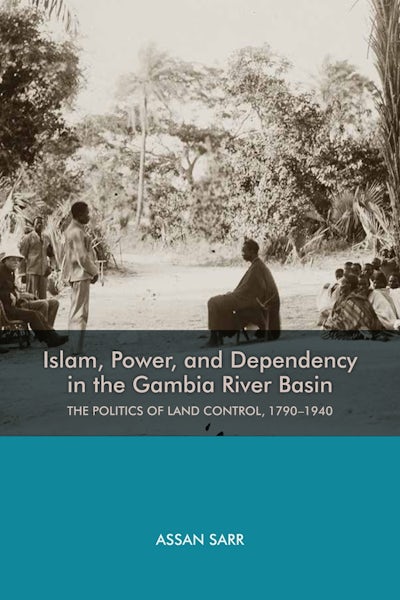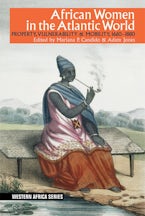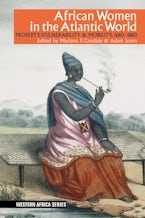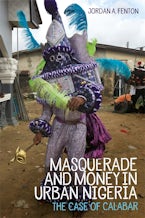
Title Details
258 Pages
22.8 x 15.2 cm
2 b/w, 3 line illus.
Series: Rochester Studies in African History and the Diaspora
Series Vol. Number:
74
Imprint: University of Rochester Press
Islam, Power, and Dependency in the Gambia River Basin
The Politics of Land Control, 1790-1940
- Description
- Contents
- Reviews
An original, rigorously researched volume that questions long-accepted paradigms concerning land ownership and its use in Africa.
Islam, Power, and Dependency in the Gambia River Basin draws on new sources to offer an original approach to the study of land in African history. Documenting the impact of Islamization, the development of peanut production, and the institution of colonial rule on people living along the middle and lower Gambia River, the book shows how these waves of changes sweeping the region after 1850 altered local political and social arrangements, with important implications for the ability of elites to control land.
Author Assan Sarr argues for a nuanced understanding of land and its historic value in Africa. Moving beyond a recognition of the material value of land, Sarr'sanalysis highlights its cultural and social worth, pointing out the spiritual associations the land generated and the ways that certain people gained privileged access to those spiritual powers. By emphasizing that the land aroundthe Gambia River both inspired and gave form to a cosmology of ritual and belief, the book points to what might be considered an indigenous tradition of ecological preservation and protection.
Assan Sarr is assistant professor of history at Ohio University.
Islam, Power, and Dependency in the Gambia River Basin draws on new sources to offer an original approach to the study of land in African history. Documenting the impact of Islamization, the development of peanut production, and the institution of colonial rule on people living along the middle and lower Gambia River, the book shows how these waves of changes sweeping the region after 1850 altered local political and social arrangements, with important implications for the ability of elites to control land.
Author Assan Sarr argues for a nuanced understanding of land and its historic value in Africa. Moving beyond a recognition of the material value of land, Sarr'sanalysis highlights its cultural and social worth, pointing out the spiritual associations the land generated and the ways that certain people gained privileged access to those spiritual powers. By emphasizing that the land aroundthe Gambia River both inspired and gave form to a cosmology of ritual and belief, the book points to what might be considered an indigenous tradition of ecological preservation and protection.
Assan Sarr is assistant professor of history at Ohio University.
Introduction
The Founding of Mandinka Settlements
Land and the Politics of Exclusion
The Power of the Wild Spirits
The End of Soninke Rule
Spiritual Persistence though Change
The Politicization of Chieftaincy
Conclusion
Notes
Bibliography
Index
The Founding of Mandinka Settlements
Land and the Politics of Exclusion
The Power of the Wild Spirits
The End of Soninke Rule
Spiritual Persistence though Change
The Politicization of Chieftaincy
Conclusion
Notes
Bibliography
Index
"Assan Sarr is making me rethink much of what I thought I knew, from four decades of study, about land, politics, and society along the lower Gambia River in the nineteenth and early twentieth centuries. This is African history at its best."
"Islam, Power, and Dependency in the Gambia River Basin is a work of substance and an invaluable contribution to the study of land and Gambian historiography. It should be of interest to academics and general readers." Canadian Journal of African Studies / Revue canadienne des études africaines
"Sarr ably demonstrates how, from the days of the Soninke rulers to the times of British colonialism, land became a tool for power grab and control. [...]This useful book must be read by Gambia's current rulers to understand why Jammeh would want to own hundreds of lots of land in a country of only 10,000 square kilometres." Africa
"In sum, Sarr has written a compelling reconstruction of the history of settlement, land use, and power relations in the Gambia River basin. Much of the argument is original and will require historians of the subregion to rethink their starting assumptions. [...]when a thoroughly researched book on the Gambia like this comes along, it is something to be cherished." American Historical Review
"Assan Sarr has written an engaging and important study about the relationship between spiritual forces, the control and use of land, and dependency by those subordinate to political elites. [...] Not only is this book an outstanding analysis of the dynamic interactions between spiritual forces, political power, dependency, and control over land in the transition from indigenous to colonial rule, it is an interesting and useful introduction to the recent history of The Gambia." David E. Skinner, Santa Clara University, IJAHS
"In sum, by bringing to the fore many core characteristics of land that have previously been neglected or misunderstood in historical narratives, this book is an excellent contribution to the history of West Africa." Aly Dramé, Dominican University, IJAHS
"This book is a very important one. Assan Sarr addresses critical issues and offers valuable, new insights from a well-researched base. [...] Islam, Power, and Dependency speaks in valuable ways to Africanist historians and other scholars, as well as to individuals who have absorbed rarely challenged ideas about Africa." JOURNAL OF AFRICAN HISTORY
Hardcover
9781580465694
December 2016
£50.00 / $60.00
Ebook (EPDF)
9781782048701
December 2016
$24.95 / £19.99
Title Details
258 Pages
2.28 x 1.52 cm
2 b/w, 3 line illus.
Series: Rochester Studies in African History and the Diaspora
Series Vol. Number:
74
Imprint: University of Rochester Press




















